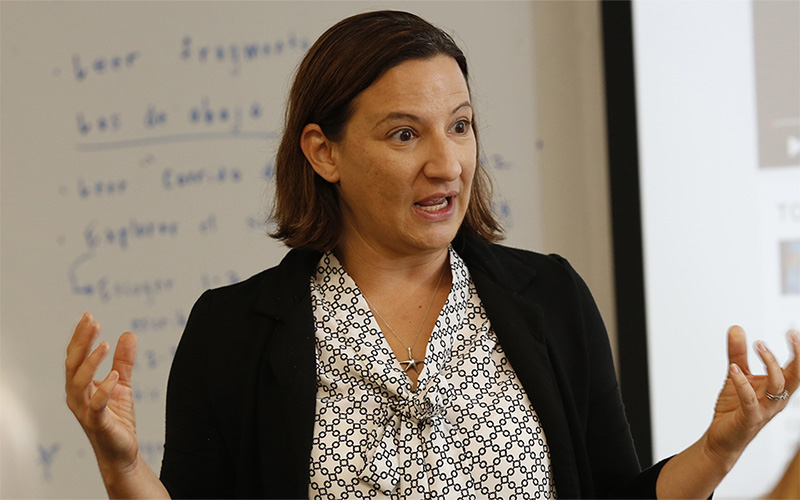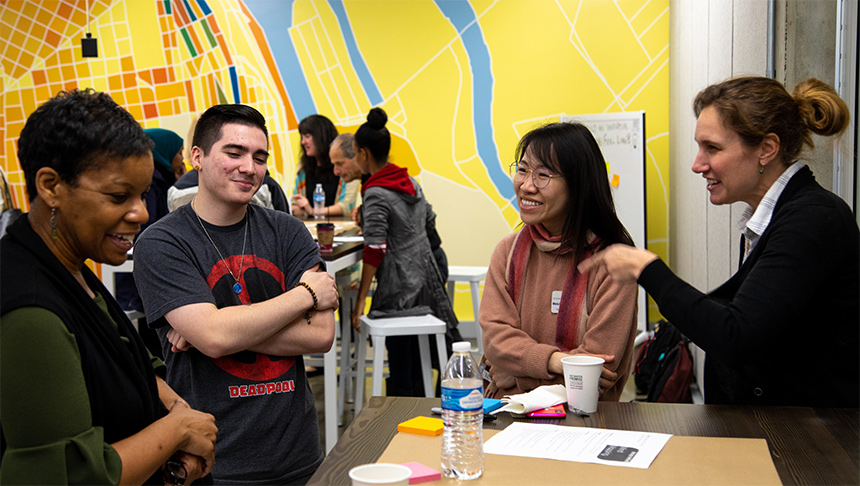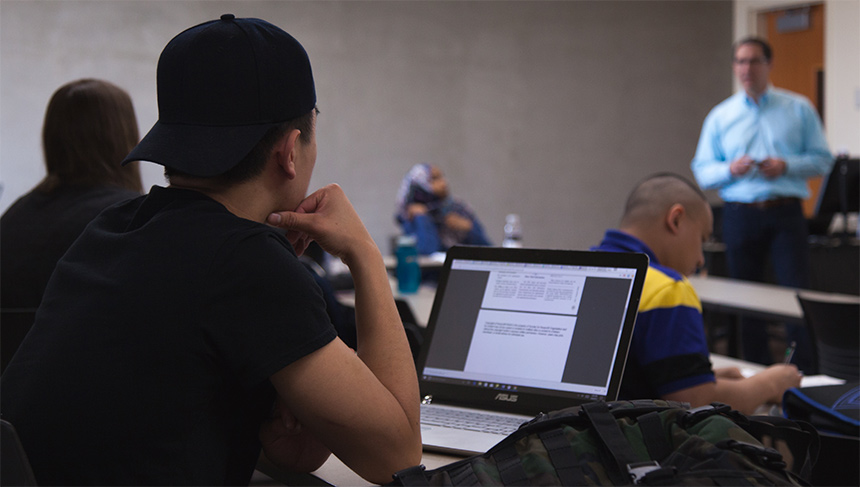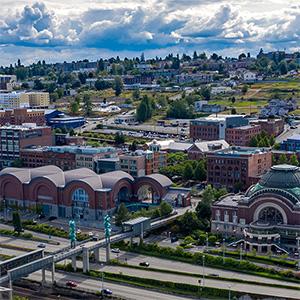
Learning in the Community
Classrooms are ground zero for UW Tacoma's commitment to community engagement. In one, students learn how they can share their Spanish skills outside the classroom.
This Section's arrow_downward Theme Info Is:
- Background Image: ""
- Theme: "light-theme"
- Header Style: "purple_dominant"
- Card Height Setting: "consistent_row_height"
- Section Parallax: ""
- Section Parallax Height: ""
(Image above: UW Tacoma Associate Professor Vanessa de Veritch Woodside teaching a Spanish language class.)
What do the City of Tacoma’s employment standards office, the Pierce Conservation District and the College Success Foundation have in common? All of them are connected to UW Tacoma through Associate Professor Vanessa de Veritch Woodside’s class, “Spanish for Community Engagement.”
“Our students told us that they want to have a meaningful impact on members of the community, especially the Latinx communities and Spanish speaking communities,” de Veritch Woodside said. “Many of our students tend to be from the region and have experienced themselves the lack of access to resources like language interpretation in medical care, or inequities, whether it be in terms of public services, issues in school systems, or elsewhere. Many have lived those experiences and they want to do something to effect positive change, particularly within their own communities.”
Hearing her students’ inspiring stories and aspirations left a profound impact on de Veritch Woodside, and when, in 2016, she was given the opportunity to develop curriculum that was focused on community-engaged work, she knew what she wanted to do. “It was a great opportunity to delve into getting our students the experiences that will help them understand how they can make their Spanish skills relevant in their communities, as well as give them professional development and help them explore what’s out there after graduation,” she said.
One major aspect of the class: de Veritch Woodside brings in both community members and alumni to speak on their work and experiences. Guest speakers come from a range of backgrounds, from art to social justice to the medical field and beyond. This creates invaluable networking opportunities for her students, and enables them to see how their Spanish skills can be applied in a broad range of contexts. De Veritch Woodside also invites alumni to speak about their experiences.
“I’ve invited an alum who was an EGL (Ethnic, Gender and Labor Studies) major a few years back who is now working with United Farm Workers,” said de Veritch Woodside. “They’ve been a part of all sorts of amazing initiatives and campaigns, and they’re getting to do international travel as part of their position. I think it’s important for current students to see and to hear from other professionals who have been where they are now.”

Even before achieving their degrees, de Veritch Woodside’s students are already making a profound impact on their communities. One such student, Adrián Cruz, has turned his attention to youth who are learning English.
“I volunteered at the Orting School District as an English Language Learners instructor,” said Cruz. “I helped students with learning the language, their homework, improving their reading, and I show support to them and their families,” he said. “I served as an interpreter and gave as much information as I could to the parents, so they had the resources they needed for them and their kids to be successful.”
Cruz, a Spanish Language and Cultures major, knows the challenges of growing up in the United States while learning English. “When I started school in America I was about nine,” he said. “I started out in third grade, and going into a school where everything was completely in English was probably one of the hardest things for me. It was very intimidating.”
Now an undergraduate student, Cruz has the resources, skills, and knowledge needed to go back and help Latinx youth who are going through same struggles that he did. “I want to help out my community,” he said. “That’s what motivates me.”
Even after the class was over, Cruz says he wants to continue working with the students. “They still want me to go back. The kids are always constantly asking for me,” he said. “That's something I do plan to continue, even though it's not a requirement.”
The class is a part of a UW Tacoma-wide initiative to develop and offer more community-focused classes. Associate Professor Erica Cline was co-chair of the High Impact Practices workgroup that helped to make classes like de Veritch Woodside’s a reality.
“Our group was focused on promoting high-impact educational practices,” Cline explained. High-impact educational practices are defined by the American Association of Colleges and Universities (AAC&U). They delineate 11 high-impact practices, including undergraduate research, community-engaged learning, seminars, capstone projects, and global learning. “Research has found that these practices disproportionately help underrepresented students be successful and engaged in college,” Cline said. “You find increases in retention and graduation rates for students who have been engaged in one or more of these practices.”
The committee elected to focus on undergraduate research as one high-impact practice and community engagement as another, and split into two groups. The groups communicate and collaborate often. Faculty, staff, students, and some community members are all participants in these “communities of practice.”
This Section's arrow_downward Theme Info Is:
- Background Image: ""
- Theme: "gold-light-theme"
- Header Style: "purple_dominant"
- Card Height Setting: "consistent_row_height"
- Section Parallax: ""
- Section Parallax Height: ""
COURSE DESIGNATIONS
At UW Tacoma, community-engaged learning courses are designated with an “S” in the course catalog. (The “S” stands for “service-learning”.) Similarly, writing-intensive courses are designated as “W” courses, and “R” marks those classes that are research-intensive.
A list of W, S and R courses is maintained by the UW Tacoma Faculty Assembly.
This Section's arrow_downward Theme Info Is:
- Background Image: ""
- Theme: "light-theme"
- Header Style: "purple_dominant"
- Card Height Setting: "consistent_row_height"
- Section Parallax: ""
- Section Parallax Height: ""
The community-engaged learning group developed guidelines for what constitutes a community-engaged class and worked to implement a special designation for classes that meet or exceed those guidelines. This way they can be easily found by students and listed on student transcripts as being community-engaged classes. At the time of writing there are 20 courses being offered in winter quarter that qualify as community engaged, from a variety of disciplines including business, communication, sociology, and biomedical science.
The focus on community-engaged learning coincides with the news that the Carnegie Foundation has bestowed the nationally-coveted Community Engagement Classification on UW Tacoma and the other two UW campuses in Seattle and Bothell. The rigorous application process for the designation assigned substantial weight to "curricular engagement," requiring UW Tacoma to document how many community-engaged courses are offered, how many faculty teach them and how many students take them.
The campus works to make community-engaged classes accessible to underserved groups. “The community engaged designation allows us to track which students are taking these classes, and see if there are any inequities based on race or ethnicity, whether first-gen status, income level, or other factors,” said Cline. “Once we know what inequities exist, we can start working to address them.”
Like de Veritch Woodside’s class, the community-engaged learning “community of practice” is inherently interdisciplinary. “We have professors and students from all kinds of areas,” Cline said. “Any class can be community-engaged.”
While any class can be community-engaged, the practices can be more difficult to integrate into certain kinds of classes. Cline, herself a professor in the natural sciences, said that it was initially difficult for her to adjust to teaching in this new manner. “I taught a global service-learning class,” she said. “I learned how to teach a science class, and to do science labs, and that’s a whole skill set. Nobody taught me how to work with students to examine their privilege when they’re working in an impoverished community, for example, and think about how to bring humility to that experience. It’s definitely a learning curve.”

Cline stressed that reflection activities must be handled carefully. “If it isn’t handled correctly, these kinds of things can actually be pretty damaging, both to our students and to our community partners”
De Veritch Woodside integrated reflection activities into many aspects of her class. “Before students started their service, I had them reflect on positive and negative learning experiences they've had both within and outside of academia,” she said. “I want to ground what the students are doing in these concepts of community-based and service learning and cultivate the understanding that they are going to benefit from the experience as well.”
It is also important for students and faculty to remember that academic growth is only one aspect of service learning. “An example reflection question from my class is: ‘Tell me what you did for your service this week and what did you learn?’ That doesn't necessarily mean ‘I learned how to enter data,’” said de Veritch Woodside. “But if you say, ‘I learned that I'm really uncomfortable in situations when I'm talking with somebody I don't know,’ that could be something that you take away from the experience, and work to create strategies for in the future.”
Cline hopes that community-engaged learning and other high-impact practices will eventually be available as an option for all students of all majors. “It can be really hard to fit it in if it’s above-and-beyond, but having it embedded in the major so that it’s something that students can choose if they want, I think is really important,” she said.
Cline emphasizes a focus on equity as the University continues to pursue high-impact practices. “Nationally, we still see a gap in participation rates for underrepresented students,” she said. “It’s really important that we build it into the major so that they know that their time is going towards what they need, and having options at different levels of intensity so that they have lots of different choices.”
Who better to explain the importance of community engaged learning than a student who experienced it? Adrián Cruz talks about what he gained from his experience with the kids in the Orting School District.
“It was great to see how much these kids have to offer, and see what the community needs,” he said.
Cruz says that the most important thing that he learned in the course was about himself. “I feel like taking that class allowed me to take action and change my mentality, which changes you as a person,” he said. “I never knew I was actually capable of helping people.”
Main Content
Carnegie Foundation Recognizes UW Tacoma Community Engagement
Collaborations with hundreds of regional partners garner all three UW campuses the coveted Carnegie Community Engagement Classification.
News Tags on this arrow_upward Story:
- Academic Affairs
- Advancement
- Awards
- Community partnerships
- Community support

